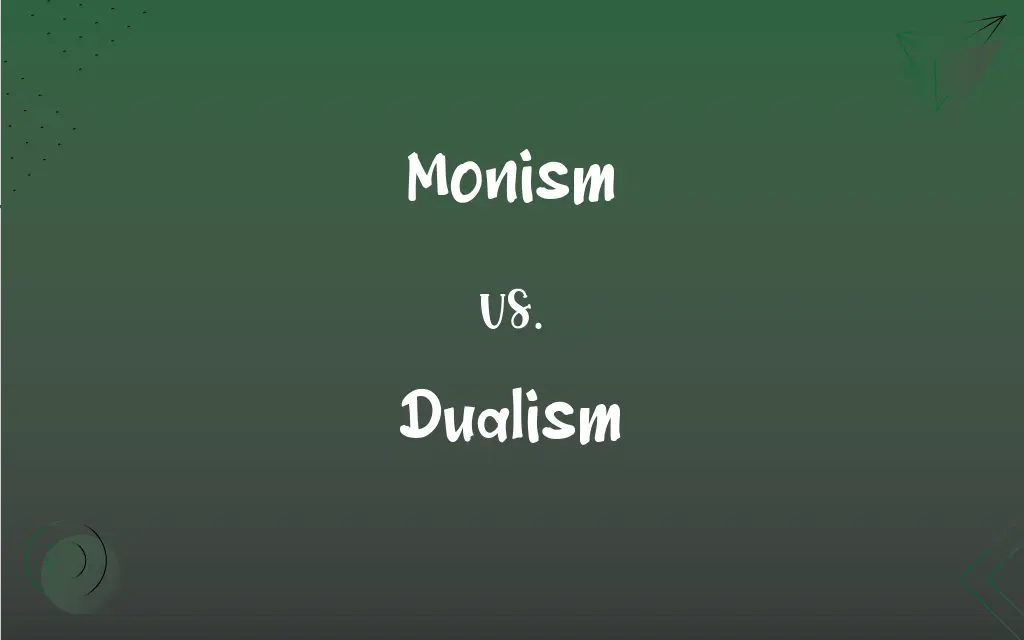Monism vs. Dualism: What's the Difference?
Edited by Harlon Moss || By Janet White || Published on January 8, 2024
Monism is the philosophical belief that everything is made of a single substance or principle, while dualism posits that reality comprises two fundamentally different elements.

Key Differences
Monism is a philosophical concept that suggests the universe and all its phenomena are composed of one essential substance or reality. This belief often leads to the idea that mind and matter are fundamentally the same. Dualism, on the other hand, argues for the existence of two separate realities, typically the physical (such as the body) and the non-physical (like the mind or soul). This distinction is fundamental in understanding the nature of human existence and the universe.
In monism, there's no division between the spiritual and physical worlds; all is seen as one unified entity. This perspective can be found in philosophies and religions that emphasize the interconnectedness of all things. Conversely, dualism distinctly separates the material world from the spiritual or mental realm. This view is prominent in many Western philosophies and religions, where the body and soul are considered distinct.
Monistic theories often lead to a holistic view of the universe, where every part is connected and interdependent. This belief can influence ethical and environmental philosophies, suggesting that every action affects the whole. Dualism, in contrast, allows for a more compartmentalized worldview, where physical actions and spiritual beliefs are seen as separate, often leading to different ethical considerations.
In the context of mind and body, monism may lead to the belief that consciousness is a byproduct of physical processes, or that physical reality is an illusion of the mind. Dualism, however, would argue that the mind and body are distinct, each with its own properties and capabilities, and neither can be fully explained by the other.
Monism simplifies existence to a single substance or principle, promoting a unified understanding of life. Dualism, in contrast, emphasizes the complexity and duality of the world, often leading to rich discussions about the nature of consciousness, morality, and the afterlife.
ADVERTISEMENT
Comparison Chart
Fundamental Belief
Reality is composed of one essential substance
Reality consists of two fundamentally different elements
View on Mind and Body
Mind and body are of the same substance
Mind and body are distinct and separate
Philosophical Implications
Leads to a holistic view of the universe
Allows for a compartmentalized understanding of existence
Ethical Considerations
Every action impacts the unified whole
Physical and spiritual actions are seen as separate
Representation in Religions
Common in Eastern philosophies and religions
Prominent in many Western philosophies and religions
ADVERTISEMENT
Monism and Dualism Definitions
Monism
The philosophy that mind and matter are not distinct.
In monism, consciousness is viewed as part of the physical world.
Dualism
The view that mental phenomena cannot be reduced to physical states.
Dualism challenges the idea that thoughts are merely brain processes.
Monism
The idea that all phenomena originate from a single source.
Monism can lead to environmental ethics that value all nature as one.
Dualism
The belief in two fundamentally different realities.
Dualism often separates the concepts of mind and body.
Monism
The belief that all of reality is fundamentally one.
Monism often leads to seeing the universe as a connected whole.
Dualism
A philosophy that distinguishes material and spiritual.
In dualism, the soul is seen as separate from the physical body.
Monism
A view that denies the separation of physical and spiritual.
Monistic traditions emphasize the unity of body and soul.
Dualism
The idea that ethical considerations for the physical and spiritual differ.
Dualism can lead to debates about the morality of physical versus spiritual actions.
Monism
A perspective that unifies all aspects of existence.
Monism in art sees beauty as a reflection of a unified reality.
Dualism
A worldview that sees existence as a balance of two elements.
Dualism in literature often portrays a struggle between good and evil.
Monism
The view in metaphysics that reality is a unified whole and that all existing things can be ascribed to or described by a single concept or system.
Dualism
The condition of being double; duality.
Dualism
(Philosophy) The view that the world consists of or is explicable as two fundamental entities, such as mind and matter.
Dualism
(Psychology) The view that mental and physical properties are fundamentally different and that neither can be explained fully in terms of the other.
Dualism
The concept that the world is ruled by the antagonistic forces of good and evil.
Dualism
The concept that humans have two basic natures, the physical and the spiritual.
Dualism
Duality; the condition of being double.
Dualism
(philosophy) The view that the world consists of, or is explicable in terms of, two fundamental principles, such as mind and matter or good and evil.
Dualism
(theology) The belief that the world is ruled by a pair of antagonistic forces, such as good and evil; the belief that man has two basic natures, the physical and the spiritual.
Dualism
The theory, originated by Lavoisier and developed by Berzelius, that all definite compounds are binary in their nature, and consist of two distinct constituents, themselves simple or complex, and having opposite chemical or electrical affinities.
Dualism
State of being dual or twofold; a twofold division; any system which is founded on a double principle, or a twofold distinction
An inevitable dualism bisects nature, so that each thing is a half, and suggests another thing to make it whole.
Dualism
The doctrine that reality consists of two basic opposing elements, often taken to be mind and matter (or mind and body), or good and evil
FAQs
What is monism?
The belief that reality is made of one fundamental substance.
How does monism view consciousness?
As an integral part of the physical world.
How does monism approach the idea of self?
Often by seeing the self as a part of a larger, unified reality.
Is dualism common in Western philosophy?
Yes, it's a prevalent concept in Western thought.
What does dualism say about the mind and body?
They are separate and distinct entities.
Does monism support the idea of an afterlife?
It varies, as monism focuses more on unity than individual existence.
Can monism lead to environmentalism?
Yes, due to its emphasis on interconnectedness.
Does dualism align with any scientific theories?
It aligns with views that separate mental phenomena from physical states.
How does dualism explain consciousness?
As a non-physical entity that interacts with the physical body.
What does dualism suggest?
That reality consists of two distinct elements, like mind and matter.
How does dualism impact ethics?
It often leads to distinct ethical considerations for physical and spiritual actions.
Can monism be religious?
Yes, many Eastern religions have monistic elements.
In dualism, is the soul independent of the body?
Yes, dualists typically view the soul as separate from the physical body.
Does monism reject the supernatural?
Not necessarily, but it sees the supernatural as not separate from the natural.
How does dualism handle the mind-body problem?
By positing that mind and body are fundamentally different in nature.
How does dualism view death?
Often as a separation of the soul from the body.
Can monists believe in God?
Yes, but their concept of God is often pantheistic or non-dualistic.
Can monism be atheistic?
Yes, some forms of monism do not involve belief in a deity.
Does dualism support the concept of free will?
Generally, yes, as it separates mental decisions from physical determinism.
How do monists view mental disorders?
Typically as physical disorders affecting the unified mind-body system.
About Author
Written by
Janet WhiteJanet White has been an esteemed writer and blogger for Difference Wiki. Holding a Master's degree in Science and Medical Journalism from the prestigious Boston University, she has consistently demonstrated her expertise and passion for her field. When she's not immersed in her work, Janet relishes her time exercising, delving into a good book, and cherishing moments with friends and family.
Edited by
Harlon MossHarlon is a seasoned quality moderator and accomplished content writer for Difference Wiki. An alumnus of the prestigious University of California, he earned his degree in Computer Science. Leveraging his academic background, Harlon brings a meticulous and informed perspective to his work, ensuring content accuracy and excellence.































































